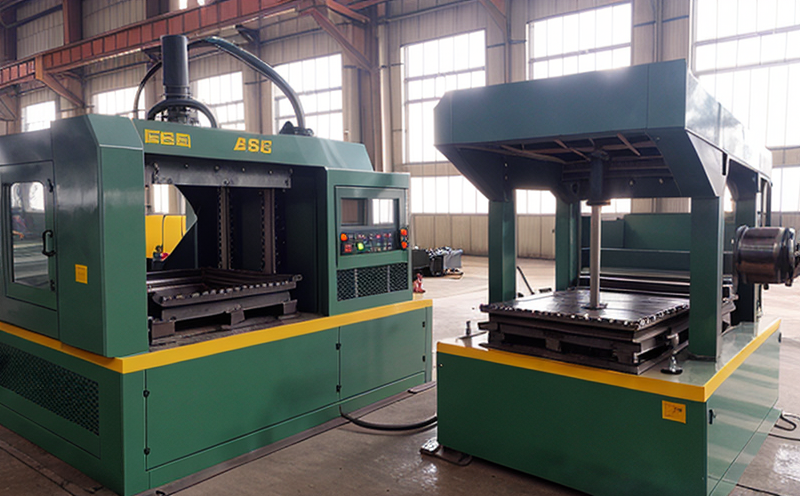ISO 4999 Surface Finish Testing of Forged Components
The ISO 4999 standard provides a comprehensive framework for measuring and assessing surface finishes on forged components. This service is crucial in ensuring that the surfaces of these critical parts meet the specified requirements, thereby enhancing their performance and durability. In industrial manufacturing and processing sectors, where quality and reliability are paramount, this testing ensures that forgings comply with international standards.
The process begins with thorough preparation of the specimen. Forged components must be cleaned meticulously to remove any oils, oxides, or other contaminants that could affect measurement accuracy. This step is critical as surface contaminants can alter the perceived roughness and thus lead to incorrect conclusions about compliance with ISO 4999 standards.
After cleaning, the component is inspected using a profilometer—a device specifically designed for measuring surface finish by tracing its contours through contact or non-contact methods. The profilometer scans the surface in both vertical and horizontal directions, collecting data points that are then analyzed to determine the surface roughness parameters such as Ra (arithmetical mean), Rz (maximum height of profile), and others specified by ISO 4999.
The accuracy of these measurements is paramount. Therefore, our laboratory adheres strictly to ISO 4999 guidelines and ensures that all equipment is calibrated regularly against traceable standards. This precision guarantees reliable data that can be used for quality assurance and process control purposes.
Once the measurements are obtained, detailed reports are generated outlining the surface finish parameters of the component. These reports serve as essential documentation during audits or when communicating with clients about product specifications. They also play a vital role in R&D projects aimed at optimizing forging processes to achieve desired surface finishes more consistently.
Understanding how different factors influence the final surface quality is crucial for maintaining consistent production standards across various industries. For instance, in automotive manufacturing, where precision and reliability are critical, ensuring that forgings meet stringent ISO 4999 specifications can significantly enhance component performance over their lifecycle.
In aerospace applications, compliance with these standards ensures that parts withstand extreme conditions without compromising safety or operational efficiency. Similarly, in construction equipment manufacturing, the integrity of surfaces directly impacts machine functionality and longevity. Thus, rigorous testing according to ISO 4999 is not just a compliance requirement but also an investment in product quality.
By adhering to these standards, manufacturers can build trust with their customers by delivering products that consistently meet or exceed expectations. This commitment to excellence through comprehensive surface finish testing underscores our dedication to supporting industries that rely heavily on precision engineering and robust materials.
Applied Standards
The ISO 4999 standard is widely recognized as a definitive guideline for evaluating the surface roughness of metallic components. It defines various parameters used to quantify surface texture, including Ra, Rz, and Ry. These metrics provide insights into the microscopic irregularities present on surfaces after forming processes like forging.
For our service, we utilize state-of-the-art equipment compliant with ISO 4999 requirements to ensure accurate and consistent results. Our laboratory maintains strict adherence to these standards throughout every stage of testing—from sample preparation through data analysis—to guarantee reliability and validity in the reported findings.
The application of this standard extends beyond mere compliance; it represents a commitment to excellence in quality assurance practices within industrial manufacturing environments. By incorporating ISO 4999 into our service offerings, we aim to support clients in achieving higher levels of product integrity while fostering greater confidence among end users.
Benefits
- Enhanced reliability and longevity of forged components.
- Improved compliance with international quality standards.
- Increased confidence in product performance through accurate testing.
- Support for R&D efforts focused on optimizing forging processes.
- Facilitation of seamless communication between manufacturers and clients regarding specifications.
- Reduction in the risk of defects leading to costly rework or failures.
Industry Applications
In sectors such as automotive manufacturing, aerospace engineering, and construction equipment production, ISO 4999 surface finish testing plays a pivotal role. Automotive manufacturers depend on this service to ensure that critical components like engine blocks and transmission gears perform optimally under rigorous conditions. In the aerospace industry, where safety is non-negotiable, compliant forgings are vital for producing reliable parts that meet stringent durability requirements.
Construction equipment companies also benefit from our testing services by ensuring that their products withstand harsh environments while maintaining optimal functionality. By adhering to ISO 4999 standards, these industries can build trust with customers and regulators alike, reinforcing the importance of quality in every aspect of production.





